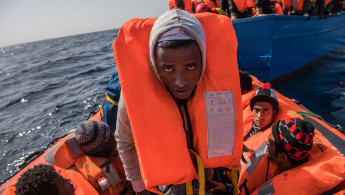The new testimonies recorded by the International Organization for Migration suggest that the trafficking and trade in humans has become open and normalised.
"The latest reports of 'slave markets' for migrants can be added to a long list of outrages [in Libya]," said Mohammed Abdiker, IOM's head of operation and emergencies. "The situation is dire. The more IOM engages inside Libya, the more we learn that it is a vale of tears for all too many migrants."
Libya, which is in the midst of a power struggle between rival factions, is a key exit point for refugees trying to leave Africa for Europe.
Due to the country's instability since the overthrow of long time dictator Muammar Gaddafi in 2011, however, migrants with sparse resources and no documentation have become increasingly vulnerable.
According to the account of one 34-year-old Senegalese survivor, people smugglers took him to a dusty lot in the Libyan city of Sabha. He and his fellow migrants had expected to be taken to the coast, however were then told that the middlemen they had dealt with had not passed on their fees to the smugglers, meaning that they would then be put up for sale.
"The men on the pick-up were brought to a square, or parking lot, where a kind of slave trade was happening. There were locals – he described them as Arabs – buying sub-Saharan migrants," said Livia Manante, a Niger-based IOM officer.
Manante, who said she spoke to earlier this month, said that the survivor's testimony had been confirmed by several other migrants she and her colleagues had spoken to.
 |
If the number of migrants goes down, because of death or someone is ransomed, the kidnappers just go to the market and buy one |  |
"Several other migrants confirmed his story, independently describing kinds of slave markets as well as kinds of private prisons all over in Libya," she said. "IOM Italy has confirmed that this story is similar to many stories reported by migrants and collected at landing points in southern Italy, including the slave market reports. This gives more evidence that the stories reported are true, as the stories of those who managed to cross-match those who are returning back to their countries."
After being sold, the Senegalese migrant was transferred to a type of makeshift prison, where he was forced to work without pay.
The existence of such places in Libya has been well documented, with captors reportedly forcing migrants into work on meagre rations while also demanding ransoms from their families.
The Senegalese migrant's captors demanded 300,000 west African francs [~$472], before selling him onto a larger jail where his ransom demand was doubled.
Those whose families did not pay the ransoms were reportedly killed, while others died slowly of hunger and disease due to meagre rations and poor sanitary conditions.
However, the overall number of people in the facility never dropped.
 |
To complicate matters further, some traffickers reportedly posing as aid groups to lure in unsuspecting migrants. The IOM says it has received credible reports of such activity from survivors |  |
"If the number of migrants goes down, because of death or someone is ransomed, the kidnappers just go to the market and buy one," Manente said.
Fearing the worst, his family began scraping funds together through loans and other means. The caprive himself was also able to negotiate a better position for himself by using his skills in speaking French, English and local African languages to work as a translator for his captors.
This won him time to allow his family to collect the ransom money.
According to Giuseppe Loprete, IOM's mission chief in Niger, his story is not uncommon.
"Its very clear they see themselves as being treated as slaves," he said.
Around 1,500 people were repatriated by Loprete's office in the first three months of this year. This number is almost equal to the number repatriated for all of 2015, indicating a huge rise in the number of people risking their safety and lives to travel through Libya to Europe.
"There are now more migrants coming back from Libya, so that's also why all these stories are coming to the surface," he said. "And conditions are worsening in Libya so I think we can also expect more in the coming months."
To complicate matters further, some traffickers reportedly posing as aid groups to lure in unsuspecting migrants. The IOM says it has received credible reports of such activity from survivors who were able to buy back their freedom.
IOM is working to repatriate those who have fallen victim to trafficking gangs, while also amplifying the voices of those who have survived the ordeal many thousands are likely to experience.
"Tragically, the most credible messengers are migrants returning home with IOM help," said spokesman Leonard Doyle. "Too often they are broken, brutalised and have been abused. Their voices carry more weight than anyone else's."





 Follow the Middle East's top stories in English at The New Arab on Google News
Follow the Middle East's top stories in English at The New Arab on Google News


